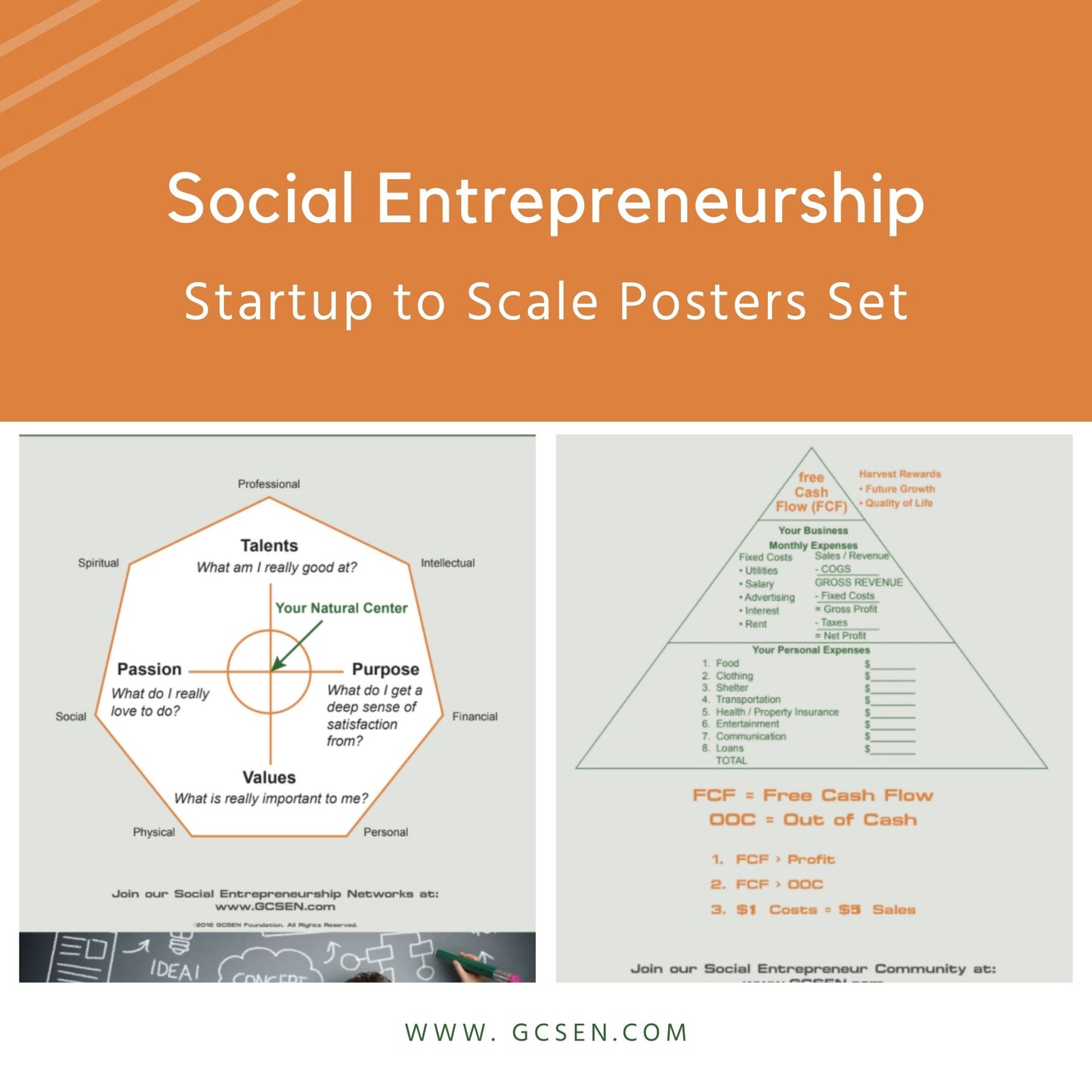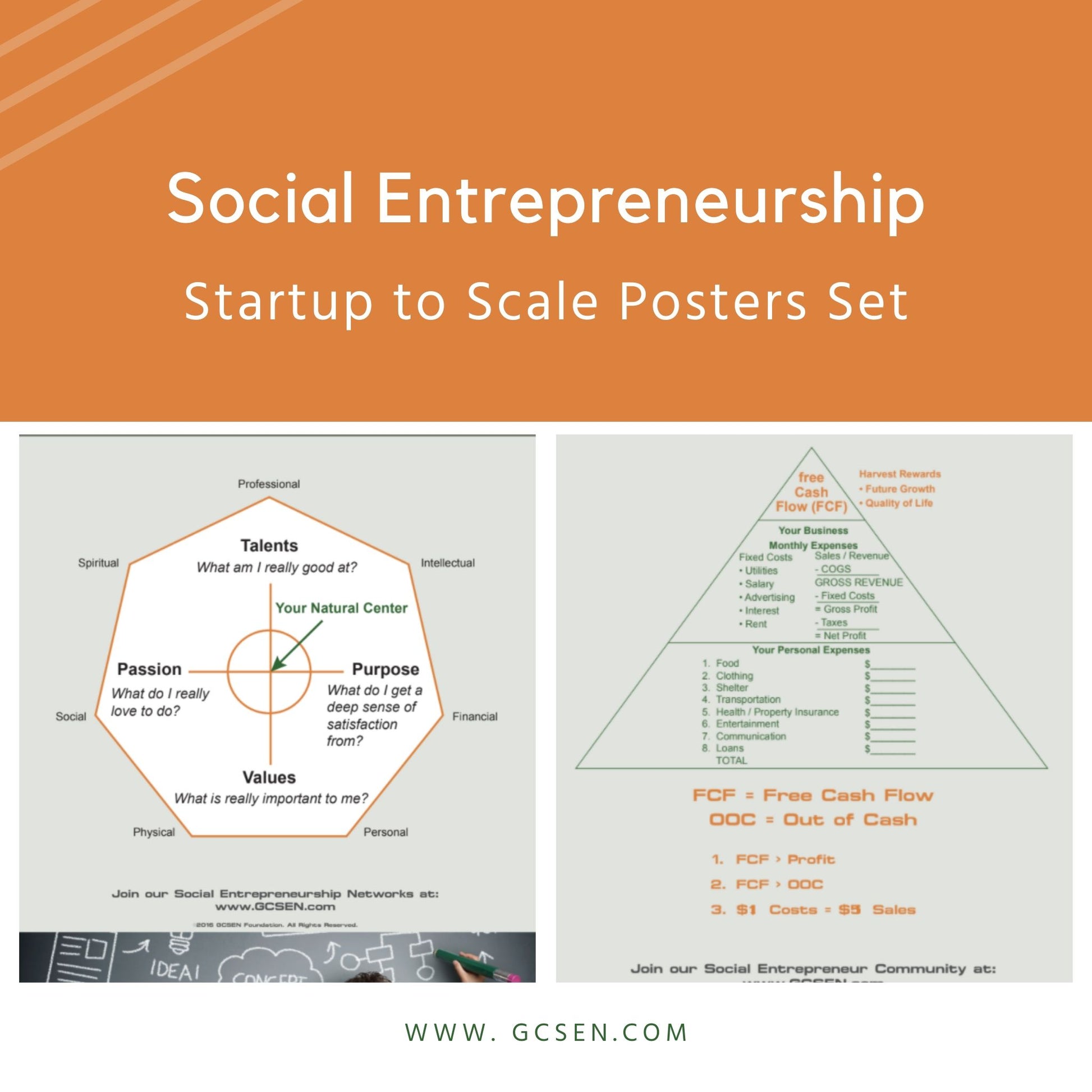GCSEN
4P Social Entrepreneurship Class/Dorm Poster Set (Downloadable PDF)
4P Social Entrepreneurship Class/Dorm Poster Set (Downloadable PDF)
Couldn't load pickup availability
The Poster Set Download Includes:
1. Natural Roles (NR): Your Natural Roles help you to discover what is truly unique about you (talents, passions, values, purpose). Your unique authentic self is evident across the many dimensions of your life, as portrayed in the diagram below.
2. The Golden Circle (GC): G.C was introduced by Simon Sinek in his influential bestseller, Start with Why: How Great Leaders Inspire Everyone to Take Action. Sinek proposed that starting with WHY and then defining WHAT and HOW provided companies with a competitive advantage over rivals who more typically start by focusing on HOW or WHAT.
3. Hedgehog Concept in the Social Sector (HC): HC was originally developed by author Jim Collins in “Good to Great.” In “Good to Great,” Collins outlined his research-based theory, that if businesses focused on one thing and did it well, they would outperform their competitors. “According to Jim Collins, the best leaders and corporate strategists reach success because they have identified their company’s unique ‘hedgehog concept.’ Identifying this concept starts with three separate assessments. First, leaders must ask themselves–what the company is deeply passionate about. Next, there should be a frank assessment of–what the company realistically can and cannot be the best in the world at. Finally, there needs to be a determination of–what drives the corporation’s ‘economic engine’—that is, an identification of the relevant profit structure and where it is rooted.”
4. Theory of Change (ToC): ToC describes a social enterprise’s path from the problem(s) you are trying to address, your major inputs and activities comprising your value-adding intervention (solution), and the positive impact(s) you intend to achieve.
5. Social Enterprise Business Model Canvas (BMC): BMC is a version of the standard Business Model Canvas, customized for a social business. For the social entrepreneur (SE), the BMC balances both the social impact objectives and business objectives.
6. Social Enterprise Financial Forecast (FF): FF includes four distinct financial concepts/tools critical to the success of your business.
7. Social Enterprise Business Plan (BP): BP is a five-page business plan that captures all the key aspects of your business strategies and plans. It is a living document that may change often based on testing assumptions, changing market conditions, and experience and lessons learned in the marketplace. This is one of the reasons we highly recommend the five-page format since it is easier to change. A long business plan format will be much more difficult and time-consuming to change, and therefore less likely to be changed, and more likely to be put on the shelf and forgotten. The Business Plan puts into prose what you have already captured in previous toolkits in other formats (e.g., outlines, question and answer, spreadsheet, PowerPoint diagrams, etc.).
8. Meaning Maker Pitch (MMP): MMP consists of two distinct deliverables – the pitch deck and the pitch. The combination of the pitch deck, pitch, five-page Social Enterprise Business Plan, and Social Enterprise Financial Forecast, comprise the majority of the materials a social entrepreneur will need to communicate the essentials of his or her social enterprise to prospective investors and other key stakeholders. Powerpoint slides are the most common form of a pitch deck. However, entrepreneurs have also effectively used posters, videos, scale models, and artist renderings. A few even might deliver their pitch orally with no pitch deck, but we don’t recommend this approach.
9. PAM4: PAM4 is a proven method, developed by GCSEN over three decades of business deal structuring experiences, which provides a critical format to create a win-win agreement, and get to yes.
10. Business Start-up Checklist (CKLIST): The Business Startup Checklist is a handy guide to organizing the critical details involved in opening a business.
11. Go Forward Plan (GFP): GFP was developed by Michael Caslin, III, GCSEN’s founder, and CEO, to guide the entrepreneur in deploying a strategy to organize the growth of a successful enterprise.
Share


